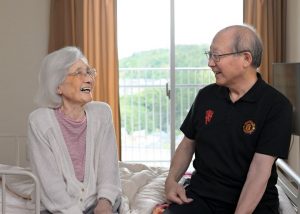Documenting Hiroshima, Witnesses to horrors of atomic bombing: Sumiko Okamoto, Son hands down mother’s memory of horrors of war
Jun. 10, 2025
Japanese-American father, mother dies in bombing
by Michiko Tanaka, Senior Staff Writer
“My father spoke English fluently. We called him ‘Papa-san,’” said Sumiko Okamoto, 95, a resident of Hiroshima’s Minami Ward, adding, “Of course, only between my family members.” During the war, English was regarded as the language of the enemy.
Her father, Shozo Suga, was born in Hawaii and held dual Japanese and American nationality. Attracted by the Japanese military that had won the Sino-Japanese and Russo-Japanese wars, he crossed the ocean and became an interpreter for the military. Sumiko was born in Tokyo, where he worked, but soon moved to Kaitaichi Town (now Kaita Town), Hiroshima Prefecture, connected with her parents’ roots.
She was the eldest of three siblings of a well-off family. “I don’t remember how many, but we had maids, as Mama-san worked, too.”
Her mother, Teruko Suga, helped run the vegetable and fruit wholesale business of her parental home. Sumiko attended First Hiroshima Prefectural Girls’ High School (now Minami High School). When she stopped by Teruko’s workplace in Tokaichi-machi (now part of Naka Ward) on her way home from school, her mother would take her to the theater or shopping. “I had a happy life.” However, the atmosphere of war grew tense, and “that day” completely changed her life.
When the atomic bomb was dropped, Sumiko was at Toyo Kogyo (now Mazda Motor Corporation) in Fuchu Town, Hiroshima Prefecture. When she got out from a nearby air-raid shelter, she saw people with severe burns walking by. As instructed, she carried them to the factory. “They kept saying, ‘Water, water,’” she said. Though she was told that they would die if they drank water, she brought damp cloths to their mouths, while soldiers were not looking.
When she was allowed to go home and reached Kaitaichi Station, her younger sister, three years her junior, was waiting. She sobbed, saying no one had come home. Fortunately, her younger brother, who was one year junior to her and had been mobilized as a student laborer, was safe. But their mother did not return. The next morning, she and her maternal grandmother, who lived nearby, began walking around her workplace.
With a desperate look on her face, her grandmother checked each of the bodies piled beside the river, calling out Teruko’s name. “I couldn’t do that. I thought parents would do anything for their children.” They searched for about a week but could not find her. She was 36.
Her father was in Keijo (present-day Seoul) on duty. Sumiko informed him of her mother’s death by telegram. He came back around autumn and began working as an interpreter for the occupation forces. Though his siblings were still in Hawaii, he never set foot on American soil again. He died in 1973 at age 68. Sumiko called up memories of her father, trying to understand his feelings. “I suppose he did not want to go there. After all, the country took his wife’s life.”
Sumiko’s son, Masataka Okamoto, 73, who lives in Nishi Ward, said, “I knew absolutely nothing,” about the feelings of his grandfather, who must have been torn between Japan and America, or the hardships his mother went through in her earlier life. Sumiko married a company employee and became a full-time housewife. She was good at dressmaking and cooking, and would bake cakes for his birthdays. As he went to school in the Kansai region, he did not receive peace education. His father, who passed away 26 years ago, was also a hibakusha, but he ended up not asking him about his experience of the atomic bombing.
He learned about Hiroshima City’s Hibakusha Family Member Legacy Successor program around the time he finished his career as a trading company employee traveling around the world. When he brought up his idea of applying, Sumiko finally spoke up. The more he listened, the more he felt, “This must not be forgotten.”
He began telling his mother’s experience two years ago. Now he tells her story about once every two months. As he wanted to pass her experience onto his children and grandchildren, he asked his daughter to translate the manuscript into English. She is married to an American and raises two children on the U.S. mainland. “What happens when an atomic bomb is used? I hope my daughter will share my mother’s experience in the U.S. someday,” said Masataka. He has a hope in his heart: His mother’s experience, along with the history of the family that weaves ties between Japan and the U.S., will be shared across generations.
(Originally published on June 10, 2025)








